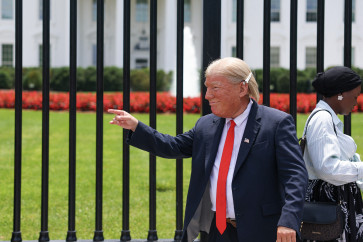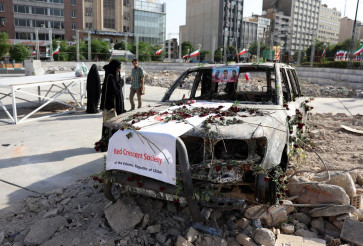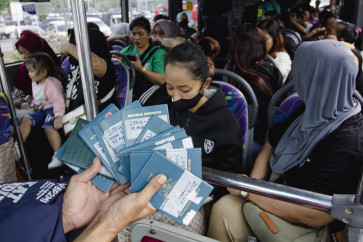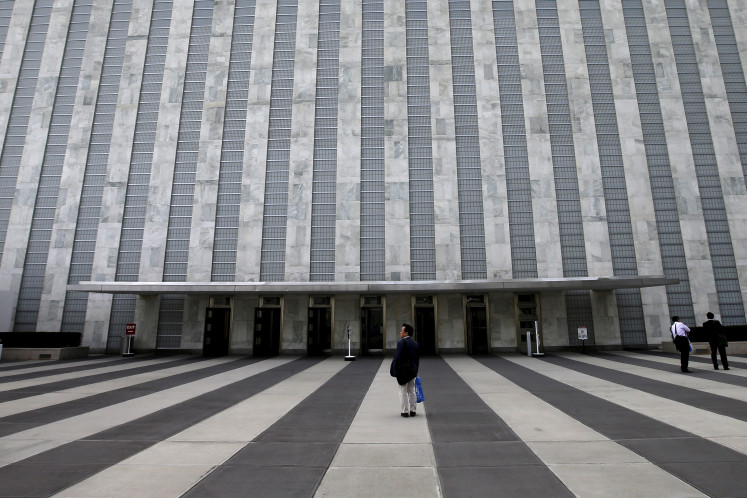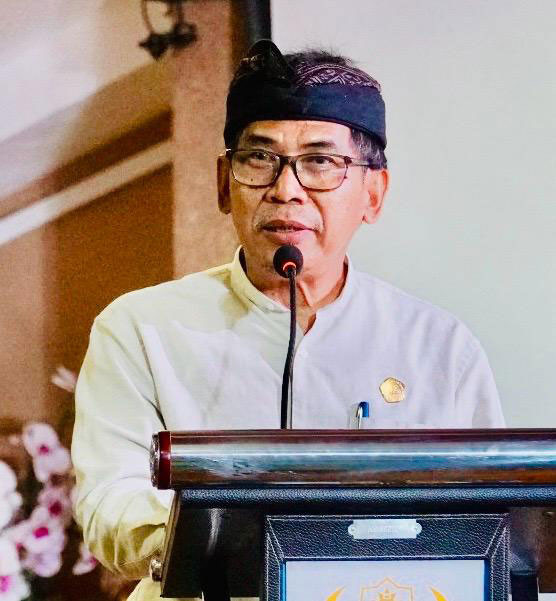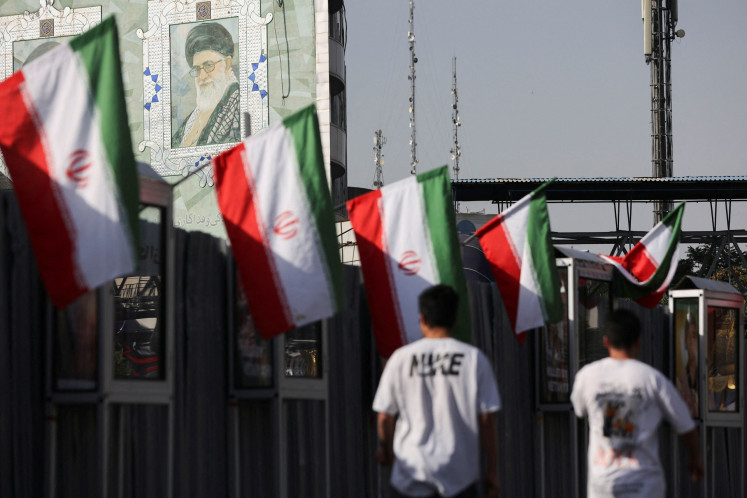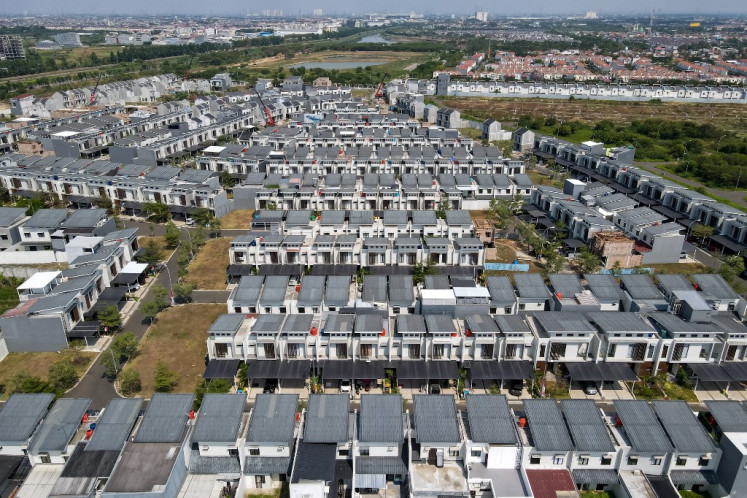Popular Reads
Top Results
Can't find what you're looking for?
View all search resultsPopular Reads
Top Results
Can't find what you're looking for?
View all search resultsBylaws should stay between religion and secularism
Sukarno did not give a special status or position to any religion. The first principle meant that the new nation-state of Indonesia would be for all religions, as evidenced by the reduction of several words from the original phrase to avoid putting one religion over the others. It also meant that religions should be practiced in a civilized way or by a mutual respect: Adherents of one religion should respect other religions
Change text size
Gift Premium Articles
to Anyone
 An executioner cans a convicted man that has violated Qanun Jinayat, or Aceh's Islamic Criminal Bylaw, at the Rukoh Mosque yard in Syiah Kuala subdistrict of Banda Aceh regency on March 1. Banda Aceh Sharia Court sentenced 18 people to six to 40 caning after they were caught violating Qanun Jinayat for gambling, drinking alcohol and public display of affection between unmarried people. (Antara/Irwansyah Putra)
An executioner cans a convicted man that has violated Qanun Jinayat, or Aceh's Islamic Criminal Bylaw, at the Rukoh Mosque yard in Syiah Kuala subdistrict of Banda Aceh regency on March 1. Banda Aceh Sharia Court sentenced 18 people to six to 40 caning after they were caught violating Qanun Jinayat for gambling, drinking alcohol and public display of affection between unmarried people. (Antara/Irwansyah Putra)
I
ndonesia’s founding fathers had successfully married religion with secularism, resulting in a neither religious nor secular country.
However, several current bylaws under the decentralization era have been passed by regional governments that firmly favor religious-orientated morals and doctrines, such as an obligation for students to wear a headscarf, the banning of food stalls from operating in daylight hours during Ramadhan, the banning of alcohol and the compulsory attendance of Christian church services on Sunday.
The bylaws fail to foster religious freedom and harmony as the ideal principles of the Indonesian ideology of Pancasila.
In religious affairs, Indonesia promotes religious harmony and freedom. Both ideals are interpreted from the first principle, belief in one God, of the state ideology and Article 29 on religion in Indonesia’s Constitution. They are the ideological commitment of the Indonesian state over religious matters.
The origin of the idea of religious harmony as a political ideology in the modern Indonesia was in Sukarno’s speech during the constitutional debate in 1945. In his speech on June 1 of that year Sukarno presented what he called Pancasila, the “five principles”: nationalism, international humanism, popular sovereignty, social justice and the belief in God.
Sukarno did not give a special status or position to any religion. The first principle meant that the new nation-state of Indonesia would be for all religions, as evidenced by the reduction of several words from the original phrase to avoid putting one religion over the others. It also meant that religions should be practiced in a civilized way or by a mutual respect: Adherents of one religion should respect other religions.
In the speech, Sukarno used the term “mutual respect” instead of “religious harmony” as the basis of inter-religious relations. The mutual respect relations between the adherents of different religions, according to Sukarno, is the expression of one of five principles of his proposed state ideology: the belief in God.
During the New Order, Suharto retained mutual respect as the interpretation of the principle of belief in God. However, Suharto added religious harmony as part of his agenda in strengthening national stability and integrity. He believed the cultivation of mutual respect and cooperation among followers of different religions and beliefs would create harmony, political stability and order.
Pancasila as an ideology of tolerance and harmony had shaped numerous public policies during Suharto’s era. After the fall of Suharto’s New Order, questions emerged about whether the state ideology was still relevant. We believe Pancasila as the ideology of tolerance and harmony is still relevant for Indonesia. We hope the central and regional governments still give attention to religious harmony in making public policy.
The state may support religious teaching as a source of law as long as it is non-coercive. The Law of Islamic Banking, for example, can be considered as a model of a middle way in religious lawmaking. In terms of religious freedom, it does not ban Muslims from being customers of conventional banks nor does it require them to open accounts in Islamic banks. They are free to choose either conventional or Islamic banks.
It would be better for us not to follow secular France, which bans headscarves in public schools, or Afghanistan under the Taliban where it was obligatory. Female student head-coverings should be entirely optional and not obligatory.
Furthermore, a current controversy about banning food stalls during daylight during Ramadhan should be seen within the framework of mutual respect as the basis of community harmony as the middle way or a win-win solution.
We can see a living hermeneutics of the principle of mutual respect during Ramadhan before the autonomy era and the introduction of Islamic-inspiredbylaws. Ramadhan curtains or curtained food stalls emerge during the month in various regions and cities. It is a local wisdom on how to deal with different interests between vendors, fasting Muslims, non-fasting Muslims and non-Muslims.
The owners put up curtains to respect fasting Muslims. This way, Muslims can fast in peace, people still have access to food and the vendors could earn money. Nobody gets hurt. That is harmonious life, a true expression of mutual respect, the wisdom of the middle way.
Since the beginning of regional autonomy, local politicians made every effort to gain majority support. Some Muslims, particularly the radicals whose sensibilities are offended when their governments tolerate immoral social behaviors, argued for change. They argue eating in food stalls during fasting hours, even if the stalls are curtained, is immoral. They cannot tolerate public immorality. Therefore, now we have intolerant bylaws.
We find intolerant bylaws not only in the Muslim-dominant regions, but also in Christian-dominant Papua. In Papua, Sunday closing bylaws prohibit or restrict individuals from engaging in certain acts on Sunday and impose legal sanctions on violators.
The measures, which are based on the biblical injunction against working on the Sabbath, commanded all citizens to rest on Sunday and required church attendance, except for non-Christians. They seek to prohibit all other activities other than church attendance, such as selling in markets, thereby removing any temptation to stay away from religious services.
To avoid intolerance and the violating of religious freedom, we argue all parties, particularly Muslims and Christians, to follow the middle way of Pancasila in evaluating current bylaws. As we know, our state was founded neither as a religious nor a secular nation.
***
The writer is a lecturer at IAIN Antasari Banjarmasin.
---------------
We are looking for information, opinions, and in-depth analysis from experts or scholars in a variety of fields. We choose articles based on facts or opinions about general news, as well as quality analysis and commentary about Indonesia or international events. Send your piece to community@jakpost.com.

